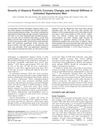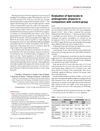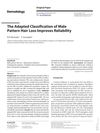 5 citations,
July 2016 in “Journal of Clinical Hypertension”
5 citations,
July 2016 in “Journal of Clinical Hypertension” Men with severe early-onset baldness may have worse heart artery function and stiffer arteries if they have high blood pressure.
 266 citations,
November 2013 in “European Journal of Epidemiology”
266 citations,
November 2013 in “European Journal of Epidemiology” The Rotterdam Study aims to understand disease causes in the elderly and has found new risk factors and genetic influences on various conditions.
 359 citations,
September 2017 in “European Journal of Epidemiology”
359 citations,
September 2017 in “European Journal of Epidemiology” The Rotterdam Study updated findings on elderly health, focusing on heart disease, genetics, lifestyle effects, and disease understanding.
 21 citations,
April 2011 in “Physiological Research”
21 citations,
April 2011 in “Physiological Research” Normal levels of DHT can reduce belly fat and increase muscle, but too much can lead to hair loss, prostate issues, and possibly heart disease.
 15 citations,
August 2021 in “Reviews in endocrine and metabolic disorders”
15 citations,
August 2021 in “Reviews in endocrine and metabolic disorders” COVID-19 and hypopituitarism (reduced pituitary gland function) are linked, with the latter's related health issues potentially worsening COVID-19 outcomes, and COVID-19 possibly increasing risk for pituitary complications.
 75 citations,
June 1999 in “Pediatric Clinics of North America”
75 citations,
June 1999 in “Pediatric Clinics of North America” The document concludes that early recognition and treatment of PCOS in adolescents is crucial for managing symptoms and long-term health risks.
 17 citations,
January 1995 in “The American Journal of Medicine”
17 citations,
January 1995 in “The American Journal of Medicine” The document concludes that proper diagnosis and tailored long-term treatment can effectively manage androgenic disorders in women, improving patient care outcomes.
 13 citations,
February 2020 in “Clinical, Cosmetic and Investigational Dermatology”
13 citations,
February 2020 in “Clinical, Cosmetic and Investigational Dermatology” Men with hair loss have higher BMI, waist size, blood pressure, and are linked to smoking and inactivity.
 1 citations,
April 2019 in “Endokrynologia Polska”
1 citations,
April 2019 in “Endokrynologia Polska” Healthy diet and exercise are important for women with PCOS to manage weight and metabolic issues, and supplements like omega-3, vitamin D, and inositol may help.
 7 citations,
January 2018 in “International Journal of Dermatology”
7 citations,
January 2018 in “International Journal of Dermatology” AGA risk factors include age, smoking, hypertension for men, and age, dyslipidemia for women; lifestyle changes may help prevention.
 49 citations,
January 2004 in “Dermatology”
49 citations,
January 2004 in “Dermatology” Men with a family history of hair loss are more likely to experience it themselves, especially if both parents have hair loss.

Tacrolimus causes fewer acute rejections than cyclosporin A in kidney transplants but doesn't necessarily improve kidney function after one year; cardiovascular risks and side effects vary between the two drugs.
 2 citations,
January 2004 in “Medical Hypotheses”
2 citations,
January 2004 in “Medical Hypotheses” Hidden fungal infections might cause heart disease and clogged arteries.
 27 citations,
January 2009 in “Journal of The European Academy of Dermatology and Venereology”
27 citations,
January 2009 in “Journal of The European Academy of Dermatology and Venereology” Men with a certain type of hair loss (AGA) have higher bad cholesterol and lower good cholesterol levels, making them more likely to get heart disease.
1 citations,
January 2015 in “Journal of Dermatology and Venereology” Early hair loss may predict heart disease.
50 citations,
May 2018 in “International journal of cardiology” Testosterone is linked to cardiovascular risk factors and stroke, but its exact role is unclear.
 28 citations,
November 2014 in “Current Diabetes Reports”
28 citations,
November 2014 in “Current Diabetes Reports” Girls with PCOS during adolescence have a higher risk of developing type 2 diabetes, and early treatment can help manage this risk.
 13 citations,
April 2015 in “Human Reproduction”
13 citations,
April 2015 in “Human Reproduction” Obese Hispanic women with PCOS are at higher risk for metabolic problems than non-Hispanic white women.
 24 citations,
July 2012 in “Current Opinion in Obstetrics & Gynecology”
24 citations,
July 2012 in “Current Opinion in Obstetrics & Gynecology” Early diagnosis and treatment are key to managing health risks in teens with PCOS.
 5 citations,
January 2012 in “Dermatology”
5 citations,
January 2012 in “Dermatology” Adapted classification better assesses male pattern hair loss and its link to heart disease.
 15 citations,
October 2016 in “Journal of The European Academy of Dermatology and Venereology”
15 citations,
October 2016 in “Journal of The European Academy of Dermatology and Venereology” People with hair loss have worse cholesterol levels, possibly linking hair loss to heart problems.
 89 citations,
November 2014 in “Medical Clinics of North America”
89 citations,
November 2014 in “Medical Clinics of North America” Eating 500 fewer calories a day and making lifestyle changes can improve PCOS symptoms and reduce diabetes risk; more research is needed on its causes and treatments.
 1 citations,
July 2011 in “Climacteric”
1 citations,
July 2011 in “Climacteric” Long-term estrogen therapy in postmenopausal women can improve certain health markers, hair loss is common regardless of hormone use, stopping estrogen doesn't increase breast cancer risk, smoking does, and a balanced BMI is linked to lower mortality.
 9 citations,
May 2015 in “Cardiology Clinics”
9 citations,
May 2015 in “Cardiology Clinics” The conclusion is that managing cholesterol is important for women, especially during pregnancy, breastfeeding, and with PCOS, and involves regular screening and careful treatment choices.
 38 citations,
June 2004 in “Human Reproduction”
38 citations,
June 2004 in “Human Reproduction” The document suggests that clinical trials for PCOS should focus on meaningful primary outcomes like live birth rates, rather than less reliable surrogate markers.
 March 2020 in “Journal of the turkish academy of dermatology”
March 2020 in “Journal of the turkish academy of dermatology” There's no significant link between blood fat levels and male pattern baldness.
 October 2020 in “Galen Medical Journal”
October 2020 in “Galen Medical Journal” Baldness is linked to a higher risk of coronary artery disease, but not to its severity.
 29 citations,
November 2022 in “Nature Medicine”
29 citations,
November 2022 in “Nature Medicine” Genetic variations greatly affect individual metabolism and can impact health and disease risk.
11 citations,
July 2019 in “International journal of women’s dermatology” Certain skin conditions in women are linked to higher risks of metabolic syndrome and type 2 diabetes due to hormone imbalances.
 5 citations,
June 2018 in “Journal of Diabetes, Metabolic Disorders & Control”
5 citations,
June 2018 in “Journal of Diabetes, Metabolic Disorders & Control” Women with PCOS may have higher bad cholesterol and are at risk for blood sugar issues; lifestyle changes are recommended.



























